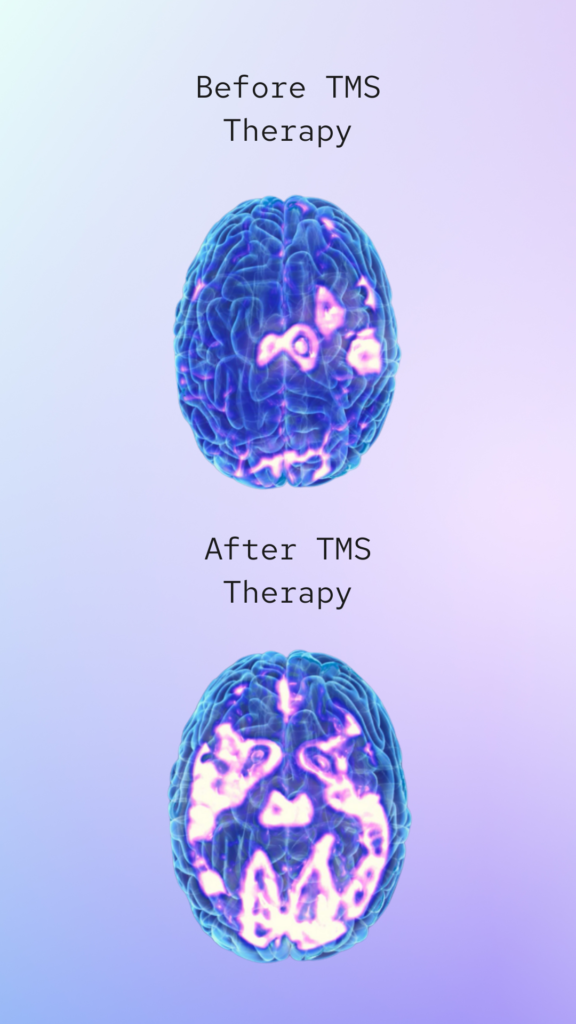TMS Therapy: An Effective Medication-Free Treatment for Depression, Anxiety, & OCD
Treating depression without medication is possible. Find relief from depression, anxiety, and OCD with an alternative treatment for depression: personalized TMS therapy near you at Bespoke Treatment.
Get StartedWhat is TMS Therapy?
TMS stands for Transcranial Magnetic Stimulation, an effective FDA-approved medication-free treatment for depression, OCD, anxiety, and other mood disorders.
During TMS treatment, controlled magnetic pulses–like those generated by an MRI machine–are delivered to specific parts of your scalp. These carefully targeted pulses help stimulate your brain’s mood centers and induce neuroplasticity. Over time, TMS treatment helps to regulate your brain activity—in turn, helping reduce symptoms.
TMS is covered by most major insurances. Unlike traditional pharmacological interventions, TMS is free of long-term systemic side effects. Treatment sessions are fast and easy, and no sedation, medication, or invasive procedures are involved. You can resume your regular activities the same day, and many patients come in for TMS therapy over their lunch break or before or after work.
Why Choose TMS Therapy for Depression, Anxiety, & OCD?
TMS treatment can offer relief for depressive symptoms and other mood disorders—even when traditional therapies like SSRIs haven’t worked in the past.
Lasting Relief
After finishing a full TMS protocol, the majority of our TMS patients experience long-term relief from symptoms of depression, anxiety, and OCD.
No Downtime
TMS therapy doesn’t require sedation or any invasive procedures. With TMS, you can resume daily activities following treatment.
Free of Long-Term Side Effects
TMS does not result in long-term systemic side effects, which many experience with traditional psychiatric medications. With TMS, you can avoid unwanted side effects like weight gain, dry mouth, or sexual dysfunction.
Covered By Most Major Insurances
Are you wondering, “Does insurance cover TMS therapy?” Most insurers do, and we accept all major insurances.
How Does TMS Work for Depression, Anxiety, and Other Mood Disorders?
During treatment, a TMS wand is applied to parts of the scalp. The TMS device delivers magnetic pulses to the brain. These magnetic pulses aren’t painful. Most patients describe the sensation as a light tap on the forehead.
These magnetic pulses stimulate or inhibit neural pathways in your brain’s mood centers to help achieve overall balance. These mood centers are specifically targeted based on your diagnoses and symptoms.
Types of TMS Therapy
We’re on the cutting edge of mental health treatments and keep up with the latest TMS advancements. We offer many different types of TMS therapy to our patients, and we’ll work with you to determine the best one for you.
Theta Burst Stimulation
A highly effective, advanced TMS option. Treatment takes as little as 3 minutes – perfect for those on the go.
Accelerated TMS
Our Accelerated TMS protocol provides rapid results in only five days.
Learn MorefMRI-Guided TMS
Personalized, fMRI-guided TMS therapy delivered with neurosurgical precision.
Learn MoreDeep TMS
Targets deeper parts of the brain involved in OCD and depressive symptoms.
Benefits Of Transcranial Magnetic Stimulation (TMS)
At Bespoke Treatment, we only offer personalized TMS therapy. Here’s why: Our independent research has found that personalized TMS therapy’s success rate is significantly higher than standard protocols.
Driven By Your Data
Personalized TMS uses advanced brain mapping and protocols. We’ll get to know you and your brain’s unique characteristics before treatment begins.
Increased Efficacy
Compared to traditional TMS, personalized TMS can be more targeted and, therefore, more effective.
Reduced Side Effects
Custom-created protocols can result in fewer TMS side effects throughout treatment.

Why Personalization Matters
Everyone has slightly different symptoms and physiology. We have mastered the art of fine-tuning individual TMS treatment protocols to increase effectiveness.
Based on your results, we’ll continuously tweak your individualized TMS therapy protocol every visit. That can mean changing the duration of treatment, the frequency of stimulation, the number of sessions, and/or the placement on the head to target different brain areas.
These parameters matter a lot when it comes to TMS, but yet they are ignored by most providers.
The Neuroscience: Why TMS Works
The brain is a complex, interconnected system with many different areas—each responsible for different functions—and intricate neural pathways. Like any complex system, there are natural checks and balances in place. Many parts of the brain work in tandem to help regulate one another.
TMS Targets Your Brain’s Mood Centers
When it comes to mood and emotional processing, there are two major players involved: the left dorsolateral prefrontal cortex (LDLPFC) and the subgenual anterior cingulate cortex (sgACC). Mood disorders like depression can often be attributed to an imbalanced relationship between the LDLPFC and the sgACC.
In non-depressed people, the sgACC and LDLPFC work to naturally regulate one another. The LDLPFC is a larger, “stronger” portion of the brain and typically works to naturally inhibit the sgACC to a degree. Still, neither is considered to be overactive or underactive. However, in depressed brains, we often see that the sgACC is “dominant” and overactive while the LDLPFC is underactive.
That’s where TMS therapy comes in. TMS therapy directly stimulates the LDLPFC and the connection point between the LDLPFC and the sgACC.
The Science Behind a TMS Treatment
Over your TMS treatment course, magnetic stimulation helps to strengthen existing neural pathways, create new neural pathways, and reintroduce the natural regulation pattern between the LDLPFC and sgACC–leading to decreased symptoms of depression and increased feelings of balance.
Does TMS Work for Other Mood Disorders?
Yes, we’re experts in TMS for OCD and TMS for anxiety– in fact, we even offer TMS for insomnia. Depending on your mental health diagnosis, you may show reduced or increased activity in the LDLPFC or in other regions of the brain.TMS therapy can help relieve symptoms by stimulating and reawakening brain activity in these regions, too.
Is TMS Right for Me?
Wondering, “Am I a good candidate for TMS?” Bespoke Treatment conducts thorough evaluations to determine if TMS therapy is best for you. Maybe you are looking for alternative treatments for depression that don’t involve medication. Or, perhaps, you’ve tried several medications and haven’t achieved your desired result. If you’re looking for scientifically proven therapies for treatment-resistant depression, you may be a good candidate for TMS.
TMS Contraindications
TMS is safe for most people. However, there are some situations in which TMS therapy isn’t appropriate, including if you have metal in your head (dental fillings are fine), a pacemaker, an implanted cardioverter defibrillator, vagus nerve stimulators, or epilepsy.
If TMS isn’t right for you, Bespoke Treatment also offers ketamine treatment in Los Angeles and Santa Monica, including infusions and intranasal sprays. We also offer other alternative therapies, such as Prism Neurofeedback.
Not sure if TMS is the best fit for you? We’re here to answer any questions you may have.

Weighing the Pros and Cons of TMS Therapy
We’re here to support you throughout your mental wellness journey. Before beginning treatment, we encourage prospective patients to weigh the pros and cons of TMS therapy.
The Pros of TMS Therapy
The best parts about TMS are that it is safe, medication-free, has a high success rate, and produces results that last long after treatment. Most major insurers can cover TMS up to 100%.
The Cons of TMS Therapy
The negative aspects of TMS are that it can cause mild headaches in some people and the treatment course can require a significant time investment. Patients must come into the office Monday through Friday day for 4 to 8 weeks.
Our Accelerated TMS option allows folks to complete their entire course of TMS in 5 days.
Unfortunately, the downside to Accelerated TMS is that it is not covered by insurance and must be paid out of pocket.
Need help determining if TMS is the right choice for you? Get in touch. We’re happy to help.
Get In TouchWhy Choose TMS therapy near me at Bespoke Treatment?
Our goal isn’t just to provide TMS therapy: it’s to provide the best TMS therapy in Los Angeles and Santa Monica.
Industry-Leading Care
Our expert staff keeps up with the latest in neuroscience and specializes in personalized TMS therapy. Unlike other TMS facilities, we don’t believe in a standard “one size fits all” TMS protocol. When creating your TMS treatment plan, our medical team carefully considers how your mental health disorder manifests in your unique brain functioning.
The Latest TMS Advancements
Our approach to personalized TMS uses the latest advanced brain mapping and protocols. We specialize in treating mood disorders with various forms of TMS, including Accelerated TMS, Deep TMS, Theta Burst Stimulation (TBS), fMRI-Guided TMS, and combination therapy—pairing ketamine treatment with TMS. We’ll get to know you and your brain’s unique characteristics to find the right approach for you before treatment begins.
Highly Personalized: Higher Success Rates, Fewer Side Effects
Personalized TMS at Bespoke Treatment considers your unique physiology and symptoms to determine your treatment areas and protocol. Compared to traditional TMS, personalized TMS is also often more effective and results in fewer TMS side effects throughout treatment.
Begin Your TMS Therapy Journey With Bespoke Treatment
Nowadays, everyone’s searching for TMS therapy near me. But why choose Bespoke Treatment? Our goal isn’t just to provide TMS therapy; it’s to give the best TMS therapy in Los Angeles and Santa Monica.
Get Started
















